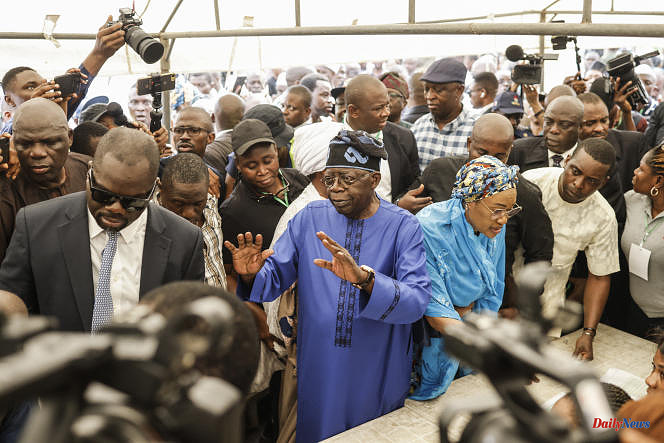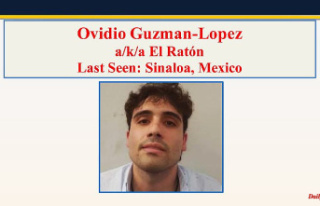The parties of Nigeria's two opposition candidates have denounced "manipulations" in Nigeria's presidential results, as Bola Tinubu of the ruling party appeared to take a slight lead on Monday evening, February 27, after a tally still partial.
More than 87 million voters voted on Saturday to choose from among 18 candidates the person who will have the difficult task for four years of redressing the most populous country in Africa, weighed down by a flagging economy, recurrent violence by armed groups and of bandits, as well as a general impoverishment of the population. Nigerians were electing a successor to President Muhammadu Buhari, 80, who steps down after two terms (as the Constitution requires), but also their MPs and Senators.
Monday evening, when the Independent National Electoral Commission (INEC) adjourned the count to resume it Tuesday at 10:00 GMT, it had so far announced the official results of the presidential election in 14 states out of the 36 of the country, except those of the federal capital, Abuja.
And Bola Tinubu, of the APC, the party of the incumbent president, led with more than 3.8 million votes, against 3 million votes for Atiku Abubakar, the candidate of the PDP, the main opposition party. The two were ahead of the outsider of this presidential election, Peter Obi, whose popularity with young people, who see him as honest and competent, took everyone by surprise: the candidate, supported by the Labor Party (LP) had until here won 1.6 million votes.
Fraud charges
However, these results are by no means final, since those of the vast majority of States have yet to be announced. And in particular key states such as Kano (north), Kaduna (north-west) and Rivers (south-east).
Saturday's vote went generally calm, despite a few security incidents and logistical hiccups. But delays in the count, and major failures in the electronic transfer of results (experimented for the first time at the national level) have fueled concerns and accusations of fraud.
The electoral commission "is compromised", and the ruling party "influenced it to change the results", accused the representative of the PDP, Dino Marleye, on Monday evening. Labor Party campaign manager Akin Osuntokun called for the announcement of the results to be suspended, saying the tallies had also been manipulated.
Overtaken at the national level, Mr. Obi however created the surprise Monday morning by winning (by very few) the largest number of votes in the strategic state of Lagos, the bubbling economic capital of 20 million inhabitants, and yet stronghold by Bola Tinubu.
The "godfather of Lagos", as Tinubu is nicknamed because of his immense political influence in the megacity which he governed from 1999 to 2007, has not yet commented on the partial national results. But he admitted his defeat in Lagos, in a press release, also calling for calm after eruptions of violence. "The importance of Obi's victory in Lagos should not be overstated," according to Eurasia Group analyst Amaka Anku. "What's important is to see what Tinubu is doing in the north, where so far he seems to be doing well, and elsewhere in his southwestern strongholds. »
Announcing the full results is expected to take some time: so far, Bola Tinubu has won six states (Ekiti, Ondo, Kwara, Oyo, Ogun, Jigawa), while Atiku Abubakar has won five (Osun, Yobe, Katsina , Adamawa, Gombe) and Peter Obi, three (Lagos, Enugu and Nasarawa).
Tight race
This presidential race is one of the tightest Nigeria has ever seen. And for the first time since the return to democracy in 1999, the country could experience a second round. Because, to be elected in the first round, the winner must obtain, in addition to the majority of the votes cast, at least 25% of the votes in two thirds of the 36 States of the federation, to which is added the territory of Abuja.
The votes of many northern states have not yet been counted. Bola Tinubu, 70, and Atiku Abubakar, 76, both Muslims, have a broad base in this region. While Peter Obi, a 61-year-old Christian, could count on votes from the southeast, his native region. The community vote is important in Nigeria, which has more than 250 ethnic groups, polarized between a predominantly Muslim north and a predominantly Christian south.
This election is crucial: Nigeria, which has 216 million inhabitants, is expected to become the third most populous country in the world by 2050, in a region of West Africa threatened by strong democratic backsliding and the spread of violence. jihadists. The continent's leading economy has become a global cultural power, thanks in particular to Afrobeat, a musical genre that sets the planet's dancefloors on fire with stars such as Burna Boy.
But, in the face of immense daily hardship, compounded by recent shortages, many Nigerians are calling for "change", sickened by decades of poor governance and an aging and notoriously corrupt elite.












